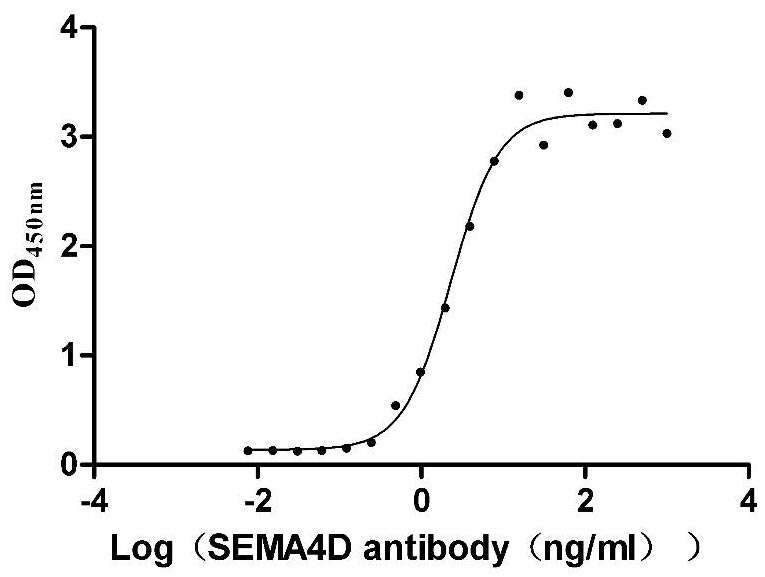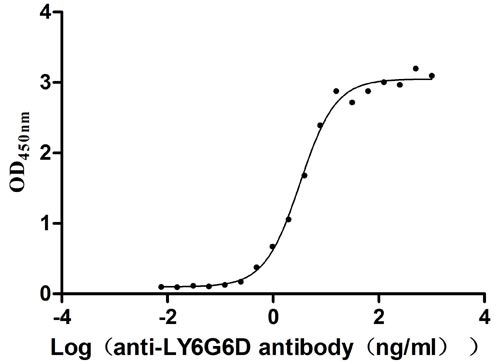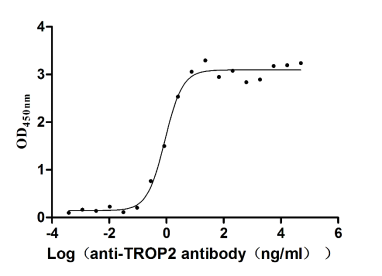Recombinant Mouse Calcitonin gene-related peptide 1 (Calca)
-
中文名称:Recombinant Mouse Calcitonin gene-related peptide 1(Calca),Yeast
-
货号:CSB-YP859124MO
-
规格:
-
来源:Yeast
-
其他:
-
中文名称:Recombinant Mouse Calcitonin gene-related peptide 1(Calca),Yeast
-
货号:CSB-EP859124MO-B
-
规格:
-
来源:E.coli
-
共轭:Avi-tag Biotinylated
E. coli biotin ligase (BirA) is highly specific in covalently attaching biotin to the 15 amino acid AviTag peptide. This recombinant protein was biotinylated in vivo by AviTag-BirA technology, which method is BriA catalyzes amide linkage between the biotin and the specific lysine of the AviTag.
-
其他:
-
中文名称:Recombinant Mouse Calcitonin gene-related peptide 1(Calca),Yeast
-
货号:CSB-BP859124MO
-
规格:
-
来源:Baculovirus
-
其他:
-
中文名称:Recombinant Mouse Calcitonin gene-related peptide 1(Calca),Yeast
-
货号:CSB-MP859124MO
-
规格:
-
来源:Mammalian cell
-
其他:
产品详情
-
纯度:>85% (SDS-PAGE)
-
基因名:Calca
-
Uniprot No.:
-
别名:Calca; CalcCalcitonin gene-related peptide 1; Alpha-type CGRP; Calcitonin gene-related peptide I; CGRP-I
-
种属:Mus musculus (Mouse)
-
蛋白长度:Cytoplasmic domain
-
表达区域:83-119
-
氨基酸序列SCNTATCV THRLAGLLSR SGGVVKDNFV PTNVGSEAF
-
蛋白标签:Tag type will be determined during the manufacturing process.
The tag type will be determined during production process. If you have specified tag type, please tell us and we will develop the specified tag preferentially. -
产品提供形式:Lyophilized powder
Note: We will preferentially ship the format that we have in stock, however, if you have any special requirement for the format, please remark your requirement when placing the order, we will prepare according to your demand. -
复溶:We recommend that this vial be briefly centrifuged prior to opening to bring the contents to the bottom. Please reconstitute protein in deionized sterile water to a concentration of 0.1-1.0 mg/mL.We recommend to add 5-50% of glycerol (final concentration) and aliquot for long-term storage at -20℃/-80℃. Our default final concentration of glycerol is 50%. Customers could use it as reference.
-
储存条件:Store at -20°C/-80°C upon receipt, aliquoting is necessary for mutiple use. Avoid repeated freeze-thaw cycles.
-
保质期:The shelf life is related to many factors, storage state, buffer ingredients, storage temperature and the stability of the protein itself.
Generally, the shelf life of liquid form is 6 months at -20°C/-80°C. The shelf life of lyophilized form is 12 months at -20°C/-80°C. -
货期:Delivery time may differ from different purchasing way or location, please kindly consult your local distributors for specific delivery time.Note: All of our proteins are default shipped with normal blue ice packs, if you request to ship with dry ice, please communicate with us in advance and extra fees will be charged.
-
注意事项:Repeated freezing and thawing is not recommended. Store working aliquots at 4°C for up to one week.
-
Datasheet :Please contact us to get it.
相关产品
靶点详情
-
功能:CGRP induces vasodilation. It dilates a variety of vessels including the coronary, cerebral and systemic vasculature. Its abundance in the CNS also points toward a neurotransmitter or neuromodulator role. It also elevates platelet cAMP.
-
基因功能参考文献:
- Hepatic PCT expression is upregulated in ALF. Hepatic macrophages but not hepatocytes are the cell source of hepatic PCT expression. PMID: 29913443
- alphaCGRP overexpression causes an increase in thermal reaction and downregulation of the cardiovascular system, presumably due in increased levels of alphaCGRP. PMID: 30068853
- Glucagon-like peptide (GLP)-1 modulates epithelial ion transport indirectly by activating calcitonin gene-related peptide (CGRP)-containing submucosal enteric neurons in the mouse colon. This GLP-1-CGRP response was area-specific and could potentially contribute to the diarrheal side effect of certain GLP-1 receptor therapeutics. PMID: 28695626
- This study demonstrated that the expression patterns of the calcitonin-related polypeptide alpha and tyrosine hydroxylase formed opposing gradients, with tyrosine hydroxylase being preferentially expressed in apical and calcitonin-related polypeptide alpha in basal type II afferent neurons, indicating heterogeneity among type II afferent neurons. PMID: 29055051
- CGRP-1 is essential for pain-associated plasticity in the central amygdala. PMID: 28833700
- These results suggest that neuronal TRPV1 signaling in periodontal tissue is crucial for the regulation of osteoclastogenesis via the neuropeptide CGRP. PMID: 27388773
- alphaCGRP played a synergic role in angiogenesis and osseointegration, partly as a consequence of its vasodilative activity. PMID: 29421662
- results indicate that CGRP regulates macrophage polarization and inhibits inflammation in murine macrophages. PMID: 28892747
- The results indicate a central role of neuroendocrine peptide aminoprocalcitonin (NPCT) in Alzheimer disease pathogenesis and suggest NPCT as a potential biomarker and therapeutic target. PMID: 27497681
- In addition to its actions in the cardiovascular system, endogenous CGRP is a key regulator of metabolism and energy homeostasis in vivo. PMID: 28324021
- findings establish CGRP neurons in the parabrachial nucleus as key mediators of cancer-induced appetite suppression and associated behavioral changes. PMID: 28581479
- These results identify an important, possibly dual role of CGRP in Amyotrophic lateral sclerosis pathogenesis. PMID: 27554772
- functional inactivation of CGRP neurons markedly increases meal size, with meal frequency being reduced in a compensatory manner, and renders mice insensitive to the anorexic effects of meal-related satiety peptides. PMID: 27166945
- Mouse and human heart valves expressed mRNAs for the CRL ligands adrenomedullin (AM), adrenomedullin-2 (AM-2) and calcitonin gene-related peptide (CGRP) and for their receptor components, i.e., CRL and receptor-activity-modifying proteins 1-3. PMID: 27553639
- The abundance of mRNA of CGRP and bone matrix markers (Col I, Col II, and OPN) was low at P5 in the tibia. These differences in CGRP and other mRNAs may induce a different manner of ossification between the mandible and tibia. Therefore, a time lag of ossification occurs between the mandible and tibia during foetal development. PMID: 28348418
- Suggest that cochlear function is enhanced by maturation of CGRP receptor complexes. PMID: 27440744
- the generation of Tregs may be promoted by naive CD4+ T cell: neuron interaction through the release of neuropeptide CGRP. PMID: 27022966
- The observations of this study imply that Adelta afferents expressing CGRP-IR transduce information from different sites within the skin. PMID: 26010480
- SHH may affect alveolar bone healing by interacting with CGRP-positive sensory neurons and thus regulate the socket's healing process after tooth extraction. PMID: 26427874
- TRPM8 signaling in mucosal sensory neurons is indispensable for the regulation of innate inflammatory responses via the neuropeptide CGRP. PMID: 25269705
- CGRP suppresses the development of leaky choroidal neovascularization through negative regulation of inflammation. PMID: 25857228
- CT has a role in skeletal biology and S1P acts as an osteoanabolic molecule and has a role in crosstalk between osteoclasts and osteoblasts PMID: 25333900
- CGRP is an inhibitory transmitter that shapes peripheral taste signals via serotonergic signaling during processing gustatory information in taste buds. PMID: 26377461
- The increased responsiveness to intraplantar calcitonin gene-related peptide suggests that the peripheral actions of calcitonin gene-related peptide are enhanced as a result of the neurofibromin deficit. PMID: 25184332
- This study provides direct ultrastructural evidences for the synaptic contacts between CGRP-positive terminals and GABAergic neurons within the central nucleus of amygdala. PMID: 24794145
- activation of periosteal mineralizing surfaces in response to mechanical loading of bone is CGRPalpha-dependent in vivo. PMID: 25536054
- Sensory neuron-derived CGRP sustains mechanical hypersensitivity and spinal microglial reactivity in collagen-induced arthritis, suggesting that central mechanisms play critical roles in chronic inflammatory pain. PMID: 25707377
- The parabrachial CGRP neurons mediate a gastrointestinal distress signal required to establish conditioned taste aversion. PMID: 25788675
- findings uncover a context-dependent molecular mechanism of TRPV1 algesic sensitization and a previously unrecognized role of alphaCGRP in LDCV mobilization in peptidergic nociceptors PMID: 25489075
- The results of this study indicated that the enhanced behavioral responses to cold stimuli in CGRPalpha sensory neuron-ablated mice are dependent on functional TRPM8. PMID: 25406633
- demonstrated that simultaneous downregulation of PPARgamma and upregulation of CGRP was efficient in suppressing adipogenic differentiation of BMSCs and promoting their osteogenic differentiation PMID: 24633961
- communication through CGRP as a novel costimulatory pathway promoting the development of a regulatory phenotype of TLR4-stimulated macrophages. PMID: 25316186
- neuropeptides CGRP and VIP have an important role in suppressing bone resorptive activities through RANKL/OPG pathway, similar to mechanical loading. PMID: 24717410
- These results suggest that contribution of the alphaCGRP system depends on the modality of pain and the stage of inflammation PMID: 24992521
- This study showed that the neurotransmitter CGRP plays a key role in ensuring VOR efficacy. PMID: 25080603
- CGRP regulates Th1 type reactions. PMID: 24466057
- There is an ongoing role of alpha-calcitonin gene-related peptide as part of a protective network against hypertension, vascular hypertrophy, and oxidative stress. PMID: 24516108
- The activation of alphaCGRP may induce other neuropeptides associated with immunomodulation at central nervous system. level PMID: 24021706
- Alpha-CGRP plays a significant protective role in heart failure which may be mediated by decreased inflammation, cell death, and fibrosis. PMID: 23816470
- SP-, CGRP-, and VGLUT2-mediated transmission together were found to play a role in the development of mechanical hyperalgesia after persistent inflammation. PMID: 24275230
- Alpha-CGRP may play an important role in the regulation of kainic acid-induced pyramidal cell death in CA3 region of the hippocampus. PMID: 23587546
- Data indicate that transient receptor potential ion channels and neuropeptides substance P and calcitonin gene-related peptide have important roles in formaldehyde promoted-asthma. PMID: 23671638
- The results clearly demonstrate that endogenous CGRP suppresses the oxidative stress and VSMC proliferation induced by vascular injury. PMID: 23416515
- DNA methylation changes were noted in the Calca gene during chronic cystitis in a murine model. PMID: 23806407
- Deletion of the gene encoding calcitonin and calcitonin gene-related peptide alpha did not influence the course of sepsis in three separate mouse models of infection. PMID: 23526213
- CT/alpha-CGRP modulates bone cell activity in PIO in aged mice in a way that is distinct from young animals PMID: 23357366
- CGRP-immunoreactive nerve fibers were specifically increased with the development of food allergy. PMID: 23261435
- The CGRP/cyclic AMP/protein kinase A (PKA) pathway is important in regulating the differentiation of T helper (Th)9 cell subset. PMID: 23509367
- The data of this study revealed that CGRPalpha sensory neurons encode heat and itch and tonically cross-inhibit cold-responsive spinal neurons. PMID: 23523592
- Hydrogen sulfide-evoked release of CGRP from sensory nerves induces increases in microcirculation of mouse ear following activation of TRPA1 receptors. PMID: 22721614
显示更多
收起更多
-
亚细胞定位:Secreted.
-
蛋白家族:Calcitonin family
-
组织特异性:Detected in nerve cells of cerebrum, hippocampus and pons/midbrain in newborns, and only in nerve cells of pons/midbrain in adult.
-
数据库链接:
KEGG: mmu:12310
UniGene: Mm.4361
Most popular with customers
-
Recombinant Human Heat-stable enterotoxin receptor (GUCY2C), partial (Active)
Express system: Mammalian cell
Species: Homo sapiens (Human)
-
Recombinant Human Insulin growth factor-like family member 1 (IGFL1) (Active)
Express system: Mammalian cell
Species: Homo sapiens (Human)
-
Recombinant Human Prolactin receptor (PRLR), partial (Active)
Express system: Mammalian cell
Species: Homo sapiens (Human)
-
Recombinant Human Signal transducer CD24 (CD24)-Nanoparticle (Active)
Express system: Mammalian cell
Species: Homo sapiens (Human)
-
Recombinant Human Angiopoietin-2 (ANGPT2) (Active)
Express system: Mammalian cell
Species: Homo sapiens (Human)
-
Recombinant Macaca mulatta Semaphorin-4D isoform 1 (SEMA4D), partial (Active)
Express system: Mammalian cell
Species: Macaca mulatta (Rhesus macaque)
-
Recombinant Human Lymphocyte antigen 6 complex locus protein G6d (LY6G6D) (Active)
Express system: Yeast
Species: Homo sapiens (Human)
-
Recombinant Human Tumor-associated calcium signal transducer 2 (TACSTD2), partial (Active)
Express system: Mammalian cell
Species: Homo sapiens (Human)


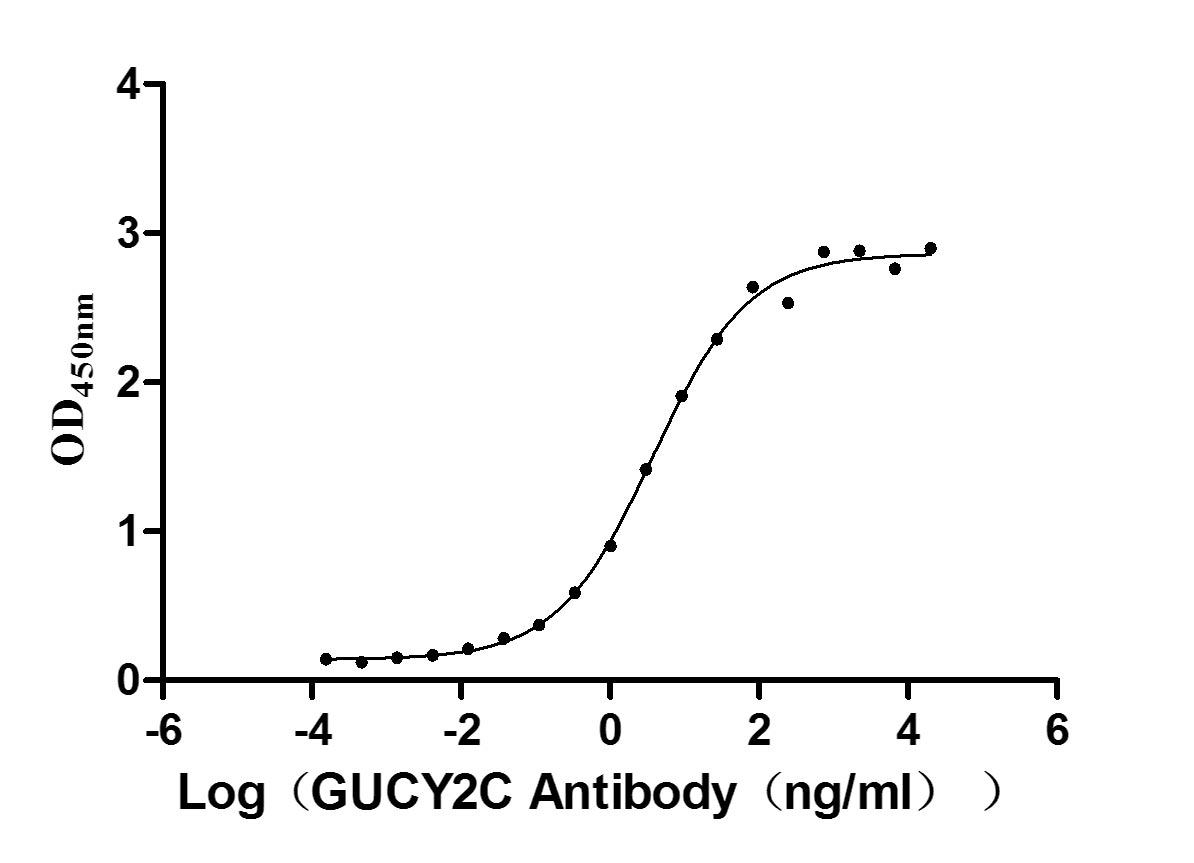
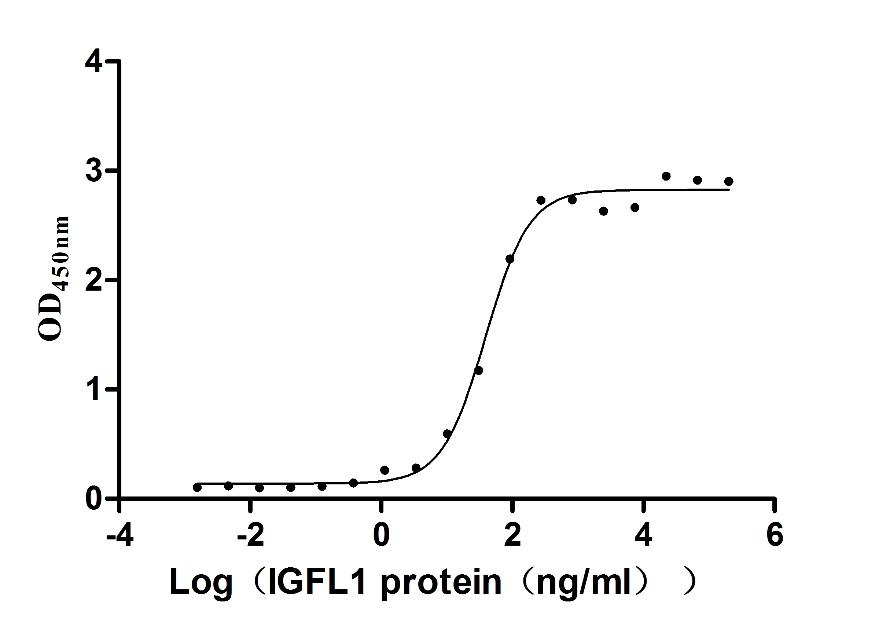
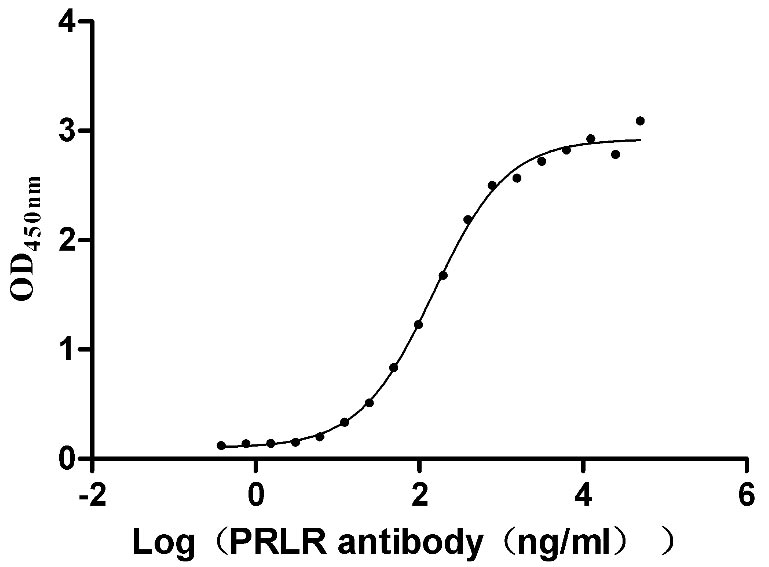
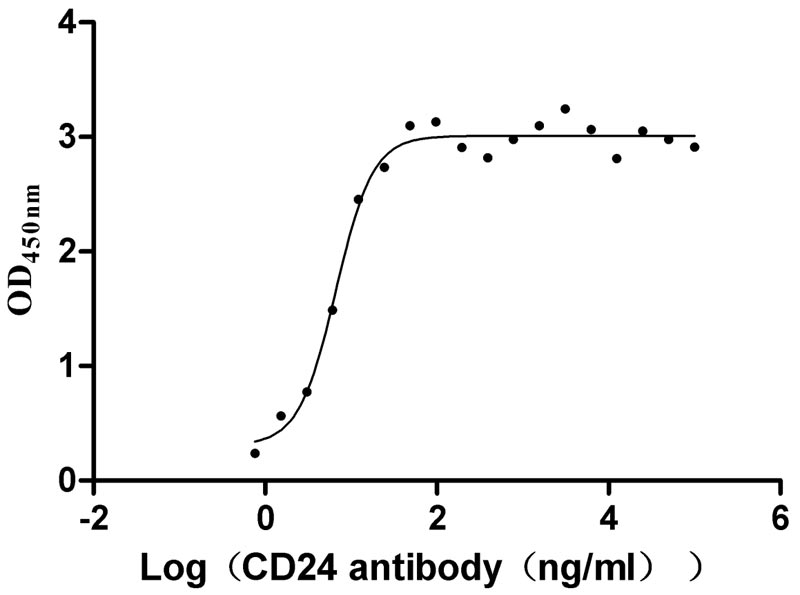
-AC1.jpg)
